The Ultimate Branding Checklist
Your go-to-branding guide is just a click away!
Ruby Jones on sticking to your values, following your creative curiosity, and staying grounded and grateful in the midst of overwhelm.

Content warning: Before we start today's episode, I want to give a heads-up and content warning because during our conversation, Ruby and I talked about an illustration she made in response to a mass shooting in New Zealand. While we don’t go into the specific details of that event, its impact on Ruby's career is mentioned multiple times. I've noted where this topic starts and ends in the blog post and transcript. Feel free to skip that section, as you can still enjoy the rest of the episode without it. Above all, be kind to yourself. If you need to miss this episode that’s fine. Do what’s best for you. There will always be other episodes, and I'd love to see you in those. Otherwise, let's chat to Ruby!
Ruby Jones is an illustrator based in Wellington, New Zealand. She likes to make art that shines a little bit of light on everyday moments and reminds us what it means to be human.
In this episode, you'll learn what happens when your art goes viral and Time Magazine becomes your first client. Insights for publishing books as an artist, how to simplify your social media strategy and follow your creative instincts, how important your values are to your creative business, and how to keep creating when the world is overwhelming.
Welcome to the show, Ruby! The people have heard a little bit in the introduction about what you do right now, but I would love to throw things back a little bit and understand where your journey has started. So my first question is, have you always been a creative?
Yeah, I have always been. It's funny when people ask, when did you start drawing? And I honestly cannot remember. It's just my brother and I from the youngest age, that's all we were obsessed with.
And I just remember as a kid, sitting around for hours, surrounded by piles of paper, just drawing little people. That's all I ever wanted to draw was people, and nothing's changed, really. I just kept drawing, honestly not thinking that it would ever turn into any kind of career. I just loved it so much and I was like this can just be my precious little side thing for me and if I ever happen to make any money off it that would be great, but I wasn't like actually pursuing it, you know.
And then I kind of feel like as cheesy as this sounds, I feel like illustration, it almost chose itself for me as a career in a way, because obviously it's a dream, but then it kind of came as such a surprise, out of nowhere.
as cheesy as this sounds, I feel like illustration, it almost chose itself for me as a career in a way, because obviously it's a dream, but then it kind of came as such a surprise, out of nowhere.
I feel like so many people find drawing people intimidating because it feels hard, but I love that you were like, “no, that's my favourite thing. I love drawing people!”
I know, it's so funny. I remember as a kid as well, thinking, why would I want to draw anything else? I think I love this idea of, every person just has so much that we don't know about, so much to discover, so many stories. And I just remember thinking, why would I draw a cat if I already know what that cat looks like? Whereas a person I could just pull everything from my brain and that person didn't exist before I drew them, you know?
Every person just has so much that we don't know about so much to discover so many stories.

Content warning begins
That's so fun. That's so beautiful.
You mentioned that sort of illustration chose itself or it chose you in a way. Tell me about that. How did you get into illustration as a career?
Yeah, so I had just been sharing my drawings for years online, just to a few hundred followers, my friends and family, and I also happened to do that one day on the 15th of March, 2019. I had done an illustration in response to the terrorist attacks in Christchurch, honestly not thinking a huge amount about that drawing when I did it. It was just such a reaction in the moment illustration and I shared that again to a few hundred people thinking this is just the tiniest hand to hold in this moment. It wasn't meant to be an enormous thing and then it kind of just took on this life of its own and somehow just went right around the world. It still feels like surreal saying that today and it was a pretty pretty surreal experience.

I remember seeing that post and everybody was sharing on their stories. I saw it going around everywhere and it definitely was this very intense, viral moment. But I didn't realise that that was the beginning of your career as an illustrator. So what did that look like in terms of kicking off your career?
Yeah, it was pretty crazy. I think I'd maybe done one paid illustration job before that. So that really was, like, kind of it. And then, honestly from that evening of 15th of March, my inbox was just flooded with offers for as many jobs as you can imagine. And then ironically my then proper first paid job was the cover of Time Magazine, which came out two or three days after that first drawing, which is like, that is so insane.
ironically my then proper first paid job was the cover of Time Magazine
So yeah, that was actually the start for me, which is bizarre. I kind of think of it like, I don't know, I feel like we all are kind of meant to follow this career path, you know, neatly going up a hill till we get to the top, when I felt like I just kind of catapulted, like, zero to a hundred.
And then, since then, I've had to kind of fill in all the steps in between.
I feel like we all are kind of meant to follow this career path, you know, neatly going up a hill till we get to the top, when I felt like I just kind of catapulted, like, zero to a hundred.
What a dream, but also kind of a chaotic like, ahhh situation where now I have to figure everything out that I wasn't really prepared to have to figure out, I can imagine?
Because did you have any of the behind the scenes things set up for doing like paid work or for having a brand? Or were you sort of playing catch up on those things.
Yeah, honestly, I had absolutely nothing. I'd just literally been drawing, I don't even think I had a desk, I'd just been drawing on my bed, and then it was suddenly like, I did have to figure all of that out within a few days, a few weeks. Because of course people were emailing saying, I want to buy this drawing and that print, and I was so overwhelmed. And it's funny as well cause there wasn't anyone around me that had been through this experience. So I kind of did have to just muddle my way through until I worked out what to do.
I kind of did have to just muddle my way through until I worked out what to do.
Yeah, totally. So how did you mentally manage the experience of going quote unquote viral, especially when it was around something so intense as the terror attacks in Christchurch?
Obviously people go viral all the time and they can sort of like, capitalize on that virality, but you're going viral because of something that's quite awful. But the content you created is a beautiful response to that.
And you want to make the most of this opportunity and this career, but then obviously something awful is happening at the same time.
How did you mentally balance all of those emotions that I can imagine were going on at the time?
Yeah. honestly I actually just mentioned this in the talk I did. I think perhaps from the outside it was easy for people around me just to kind of be excited and see all these dreams coming true, but it took so long for me to not just see the black and white of it, which was that 51 people had died, and then all of my dreams were coming true, and how's that fair?
I think perhaps from the outside it was easy for people around me just to kind of be excited and see all these dreams coming true, but it took so long for me to not just see the black and white of it
How can I place that in my heart to move forward and to not be filled with guilt every day? Which I was for a long time and it took years to work through for me just because it was massive and it wasn't easy at all.
How can I place that in my heart to move forward and to not be filled with guilt every day?
But I kind of just like you said, I just had to remind myself of what the illustration stood for and what it did for people and bring everything back to that and just continue to make work that made people feel the same way, made people feel connected and seen and heard, and it was a big journey.
I just had to remind myself of what the illustration stood for and what it did for people and bring everything back to that and just continue to make work that made people feel the same way
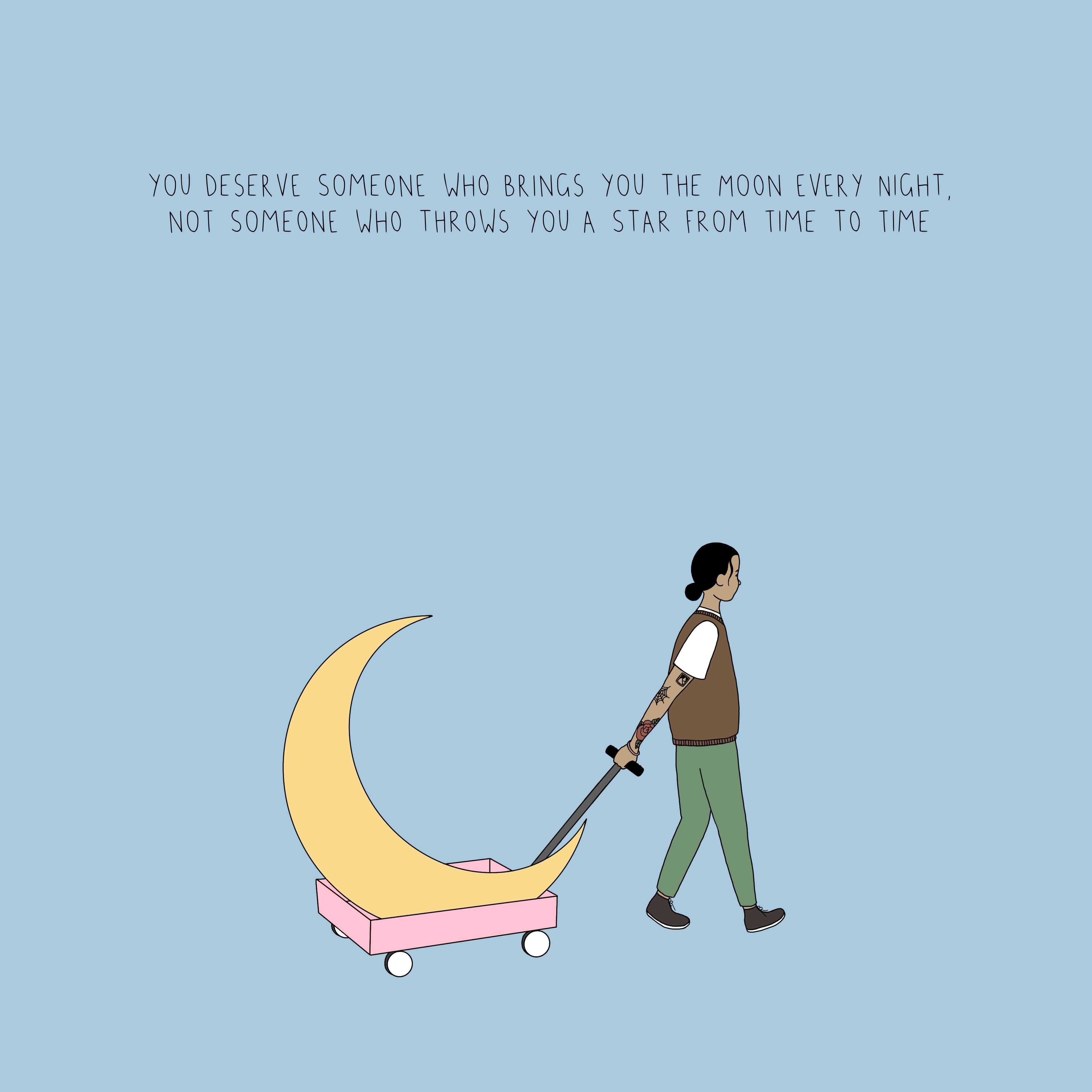
Content warning ends
I can imagine. And so since then, and as you just said, the work that you do create and you have been creating still talks about really big topics, but has these continuing themes of joy and light and togetherness.
Why is that so important to you? Why are they such big themes in your work?
I don't know. I think I've always been drawn to art that does that, that shines a light on even the tiniest moments that we will go through and maybe don't talk about. And I think, I don't know, I think there's something sort of beautiful in feeling comforted even by the tiniest drawing by someone or something.
I think I've always been drawn to art that does that, that shines a light on even the tiniest moments that we will go through and maybe don't talk about
And I think when I realised, oh, I can make art that can also do that for people or make people feel seen even in the smallest ways, I just remember thinking why would I want to do anything other than that? I just, I think I love kind of stopping and like, we run around crazily in life, everyone's always frantic and we've got a million things to do. And I kind of also like making just like a little pause in there as well, you know it reminds us to stop and look after ourselves, look after each other.
when I realised, oh, I can make art that can also do that for people or make people feel seen even in the smallest ways, I just remember thinking why would I want to do anything other than that?
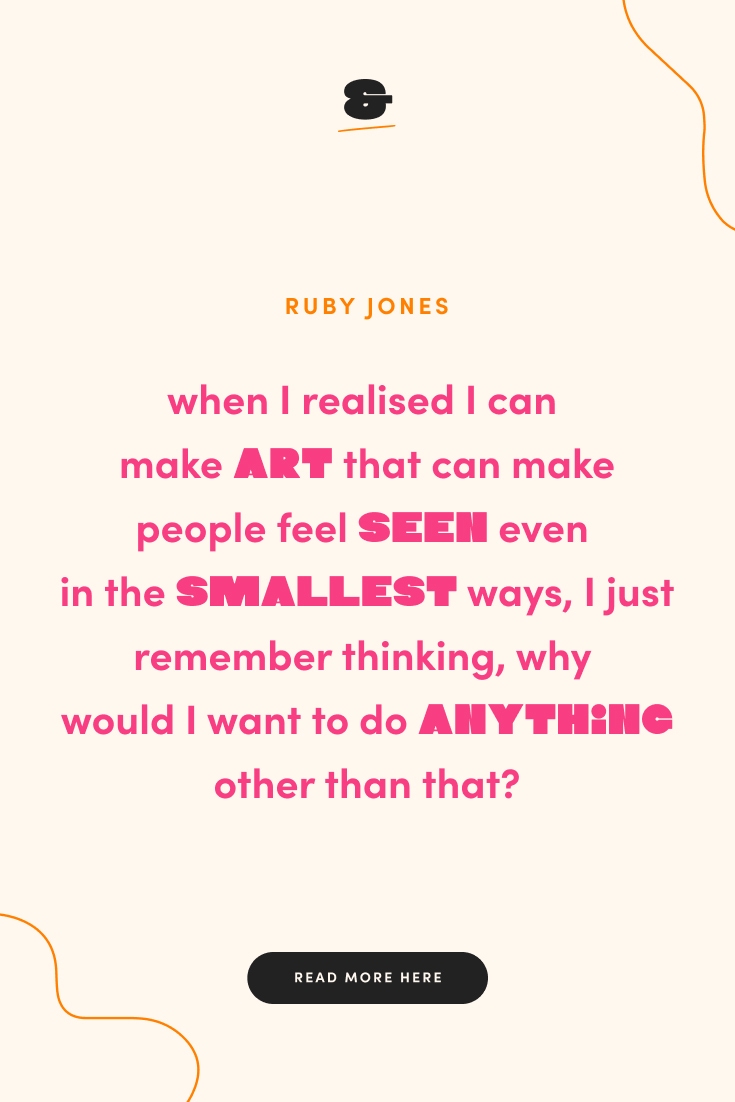
Yeah, totally. I know like at the moment you have on your store this print that's different cups of tea and the different moments that you have different cups of tea in. And I love that print because cups of tea to me are just those little moments of joy in your day or moments of calm or moments of connection.
I have a lot of things going on in my life, but every moment that I can sit down and just have a cup of tea is a moment that I can just take a break and just calm down and come back to myself. Or I can sit down with a friend and have a cup of tea. Or it's just those little moments that you can remind yourself that everything's okay or if I can just focus on this cup of tea right now, that everything will be okay.
Yeah, I know there's there is something about a cup of tea as well. It feels like, I don't know, it's something incredibly comforting in all those different moments. Yeah, thank you.
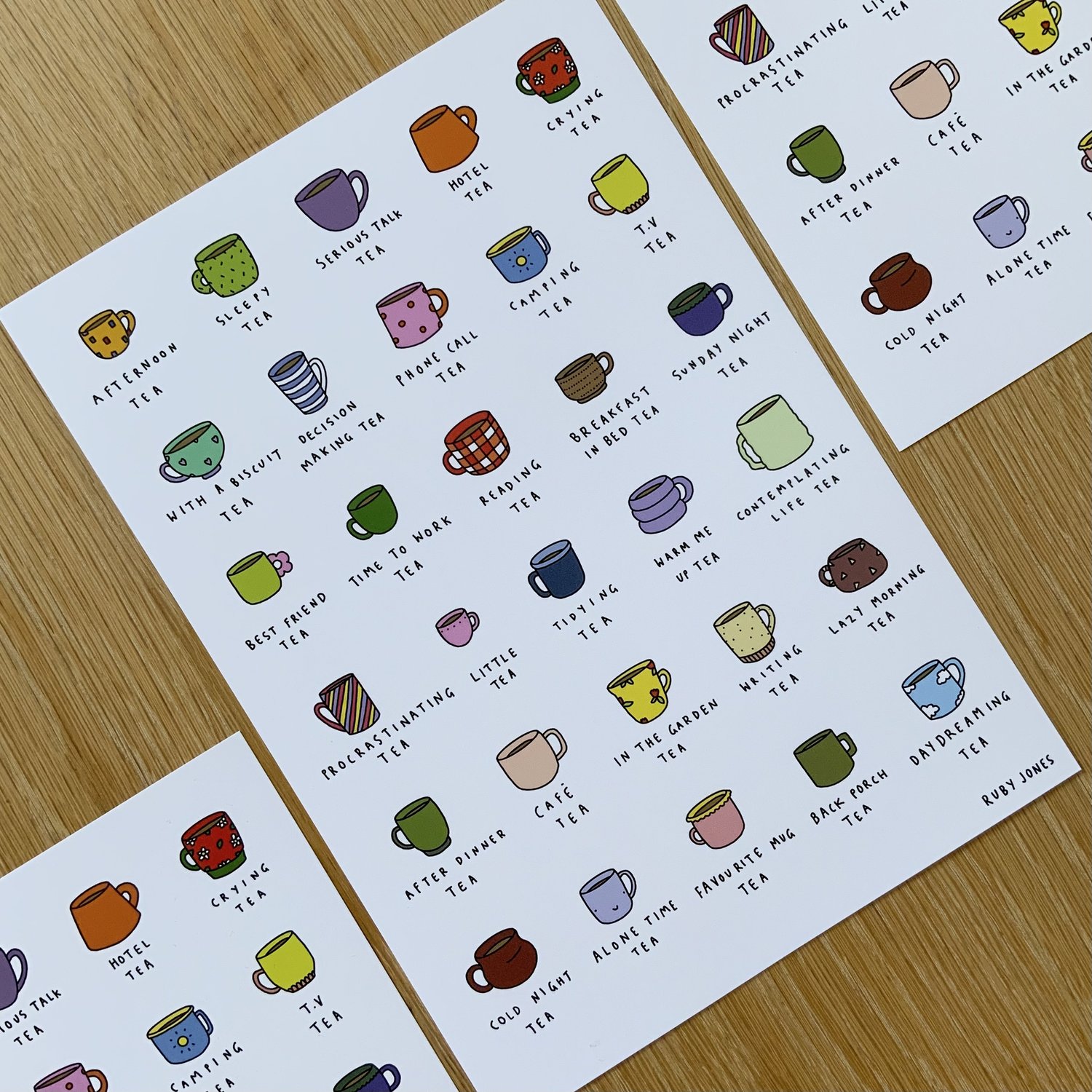
Yeah, no problem. I'm from England originally and I think every British person feels like a cup of tea can solve absolutely everything which is just ridiculous. But I love that you have those messages.
And it feels like you have really like very clear values in yourself and your business and your work.Is that something that you have done intentional work to figure out in your brand, or did they come naturally over time? Have you done any sort of brand strategy work?
Oh my gosh, I actually haven't. I feel a little bit useless in all the kind of business side of it all, to be honest. I think what it comes down to for me is just that I continue to be my most authentic self and I want that to always come through in my work and me as a person.
It was kind of hard initially when I was totally thrown in the deep end and I was sort of like, oh, I could go in literally any direction right now. And, I think I did just kind of have to make that decision of pulling it right back to like, no, what do I actually love making, what makes me happiest, and as boring and simple as it sounds, I just do try and stick to being a nice person, being kind, and yeah, I don't know.
I don't have much to offer in that in that space, except just, I don't know, treat everyone you work with with the most kindness and then it comes back to you.
what it comes down to for me is just that I continue to be my most authentic self and I want that to always come through in my work and me as a person.
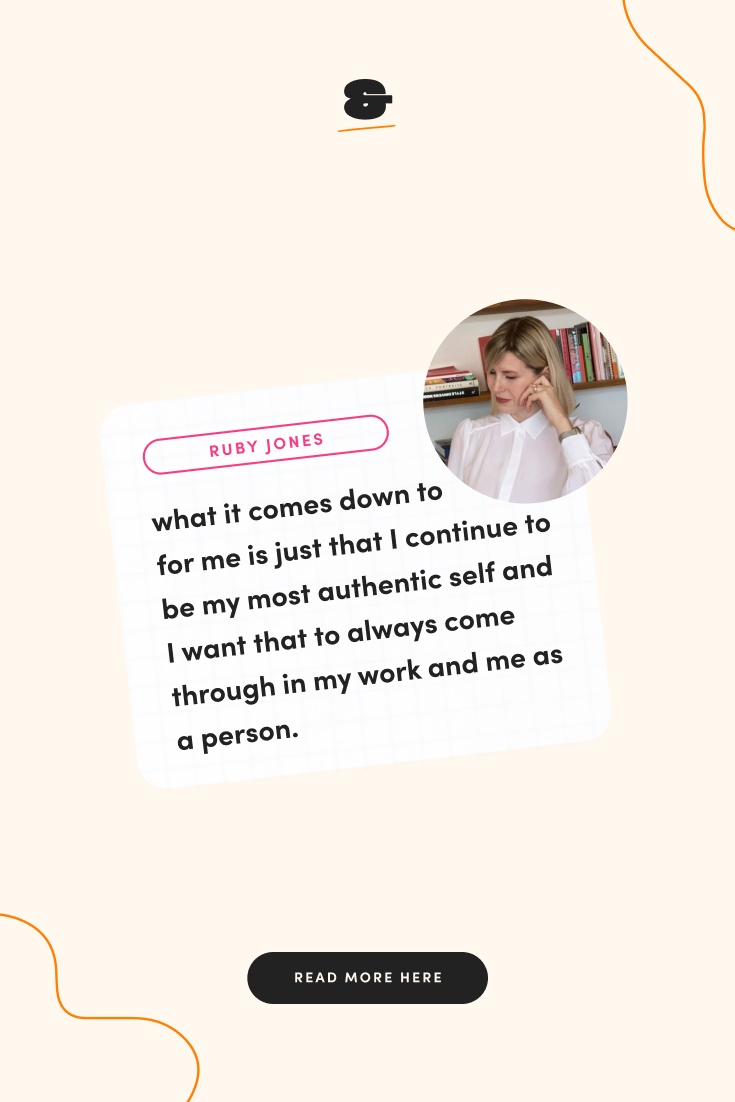
Yeah, absolutely. And it sounds like you said you haven't really done some brand strategy work, but you kind of have by trying to ask yourself those questions. That is what brand strategy is, figuring out what's important to me and what do I want to say and what do I want to come across as. That is that work, so you did it in a sense, but not in any structured kind of sense, but that's fine!
Yeah, yeah, yeah. I do remember actually, when everything started, I had one friend who said, just keep asking yourself, when you're going to start a new project or something, does this align with your values and will you be proud of this in a few years to come? And I feel like I did continuously come back to those two questions, which is still really helpful to this day.
Those are great questions for sure. Props to that friend!
And then in terms of your visual brand, tell me about that. Have you done any work in terms of fonts, colours, any of that stuff?
I do try and stick to a pretty pastel tone palette all the time. I think I just like creating a soft gentleness in my work. But I mean, it's fun to play around with different colours as well.
I've done a lot of work around fonts, really. I feel like I sort of found my my handwriting. just my general handwriting font seemed to, I don't know, people seem to respond to that, and I ended up using that in my books, and I've kind of probably maybe overused it now, but it feels like a sort of treasure that I try and hold on to in all my work.
I did something a while ago with Times New Roman or something and I was like oh, this feels, I love it in any other context, but, but in my own work, I was like this is just not right, you know. I love any hand lettering.
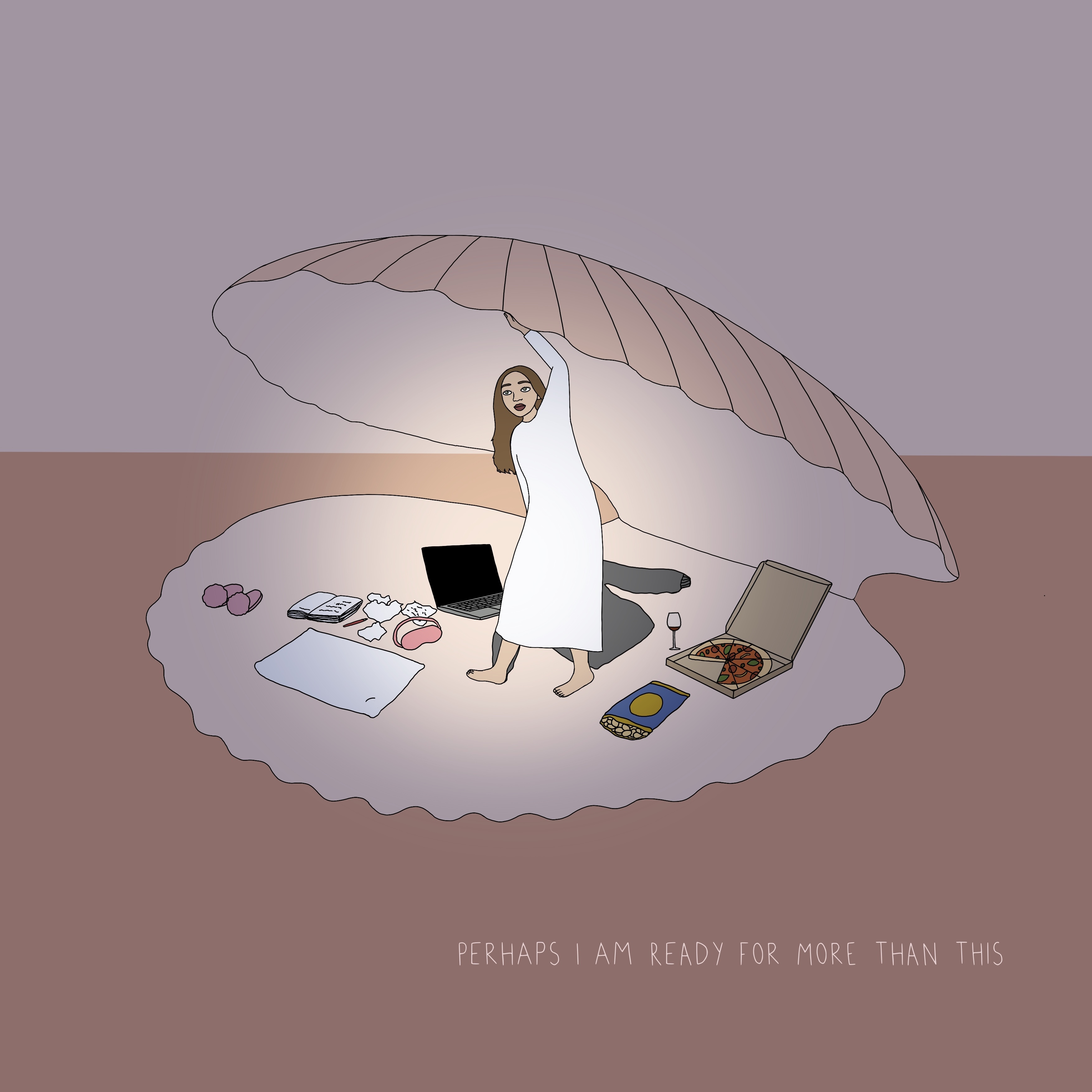
Yeah, well, I think that's what makes your work unique, right? I can spot your handwriting from a mile away, especially in combination with your illustration. It just screams Ruby. I think it just is you and it makes all your work feel like yours.
So why change it if it works and it is so uniquely yours. And no one else can write like you do. So if it works, it works.
Yeah. Yeah, absolutely.
You mentioned that you use them in your books and you have launched and released two books. So tell me a little bit about the experience of getting to release books. It's so exciting!
Obviously the first one, All Of This Is For You, came as a result of the that initial illustration, is that right?
Yeah, so I was contacted by a Penguin a month after that first drawing. That was all just this kind of rapid succession of things that don't happen. They were just like, “hello, could you do a book in six weeks?” So yeah, I still am like, I don't know how, where I pulled all those illustrations out from, but the concept for that was kind of just to make a book of reminders of how to hold on to that kindness that we were so good at showing in the immediate aftermath.
“hello, could you do a book in six weeks?”
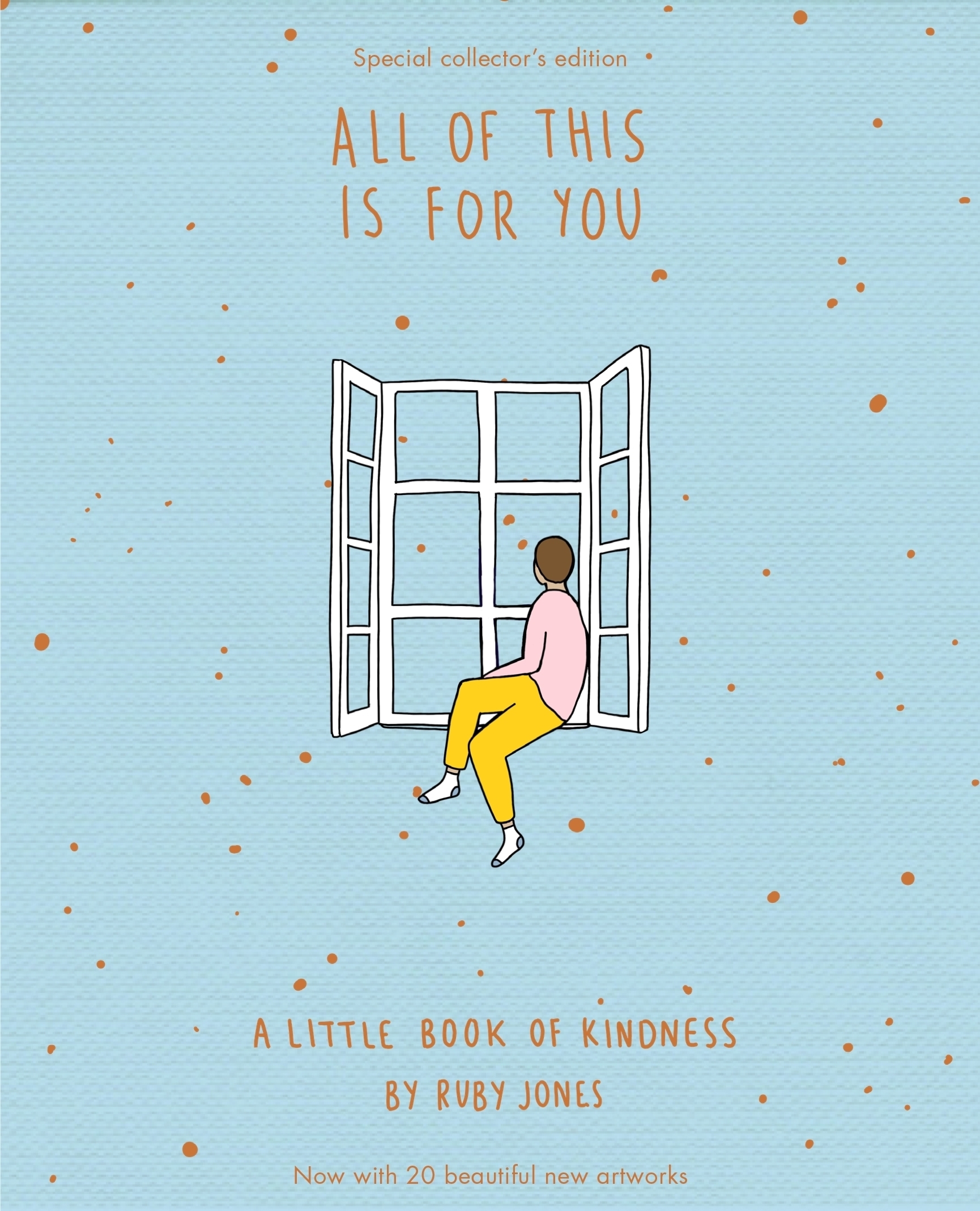
And then that book kind of just took on a life of its own. That first drawing, I'd be sent photos of it from all around the world, and it's been translated, and it's just pretty magical. That was four, four years ago now.
And then my second book, In This Body came out a year ago. And that one's more about body image. It's a little bit bigger. It's slightly more like following a narrative. Whereas the other one was standalone illustrations.
But yeah, I think books are what I really want my career to be full of if that can be possible. I just I think they're the most fun project to work on. And I've worked with an amazing team here.
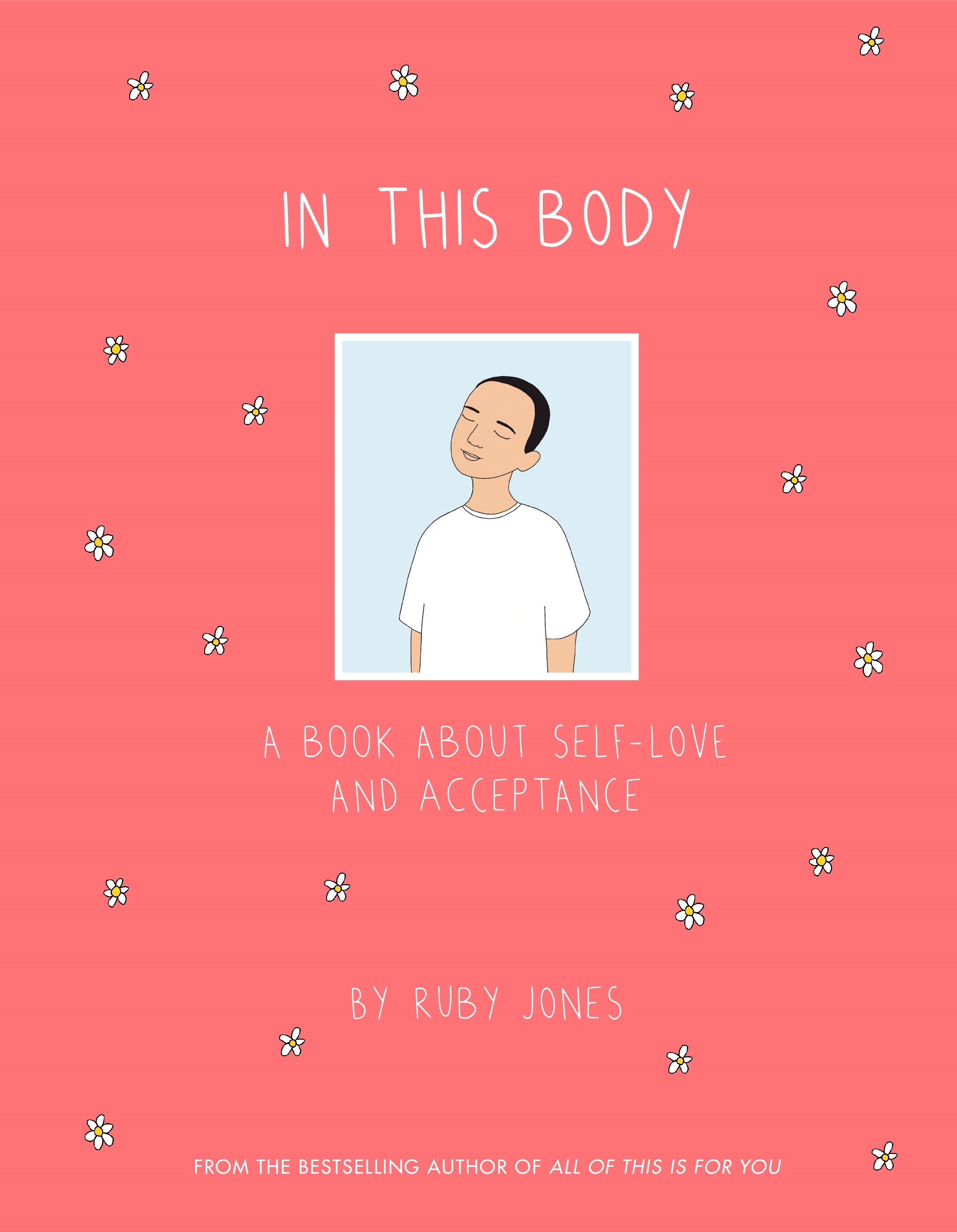
Incredible. I can imagine a lot of illustrators would have that as a dream to write or illustrate or release a book. Do you have any tips or insights about the book publishing or writing process that you think illustrators would like to know?
I think the first thing is books are incredible and being published is incredible, but I think there is this illusion that it instantly means you're incredibly successful. And I would just say up front, to make money in books, you have to sell like a whole ton. So I think there is this sort of slight misconception there. That's just, I'm being grumpy on my first point.
My second point, it can be really fun if you have an idea for a book and maybe you're not the illustrator or you don't have the right words and then finding someone whose work you love and bringing a proposal together like that and then sending that off to some publishers rather than just sending in an idea on your own can be kind of fun.
But I guess also as well, there's a lot of publishing houses here and overseas. I think people just think of the big ones a lot of the time. So I think it's so worth having a Google and looking at how many there are. Even in New Zealand, there's a whole bunch.
And self publishing as well, I think is such a great avenue to go down. A friend of mine, I think he self published two or three books, and then he was published by Penguin here. I feel like that can also be a nice way to start out, if you can afford it.
Those are great tips. Like you said it's such a big dream, but just having insights from somebody who's actually done it is really valuable.
And I think in terms of the fact that you have to sell those books, obviously you also have a shop full of products and you're getting client work and stuff too.
I'd love to talk to you about like social media and marketing in general. Do you have a social media strategy?
Mm, I don't I'm terrible, I don't really have a strategy at all no. Honestly, my only thing is that I do try and connect with as many people on there as possible. Anytime someone takes a moment of the day to send me any message, I always respond because I'm so aware of that's literally how I got my start and I feel like I owe everything to every single person on there supporting me.
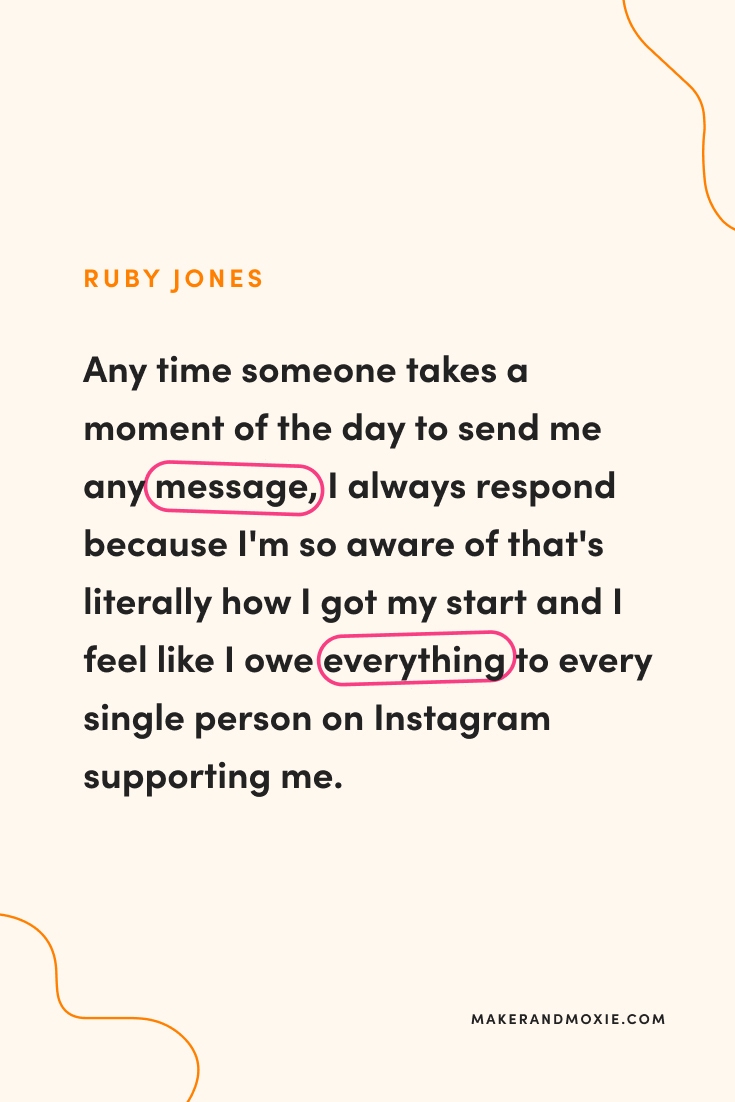
anytime someone takes a moment of the day to send me any message, I always respond because I'm so aware of like, that's literally how I got my start and I feel like I owe everything to every single person on there supporting me.
So I just remember that. And I kind of loved it. I think for a long time, I got into that awful headspace of being terrified of social media. You know when the anxiety works up and you're like, I have to post every three days and it has to be this good. And, and then I just started remembering that no one's sitting around waiting for you to post something.
no one's sitting around waiting for you to post something.
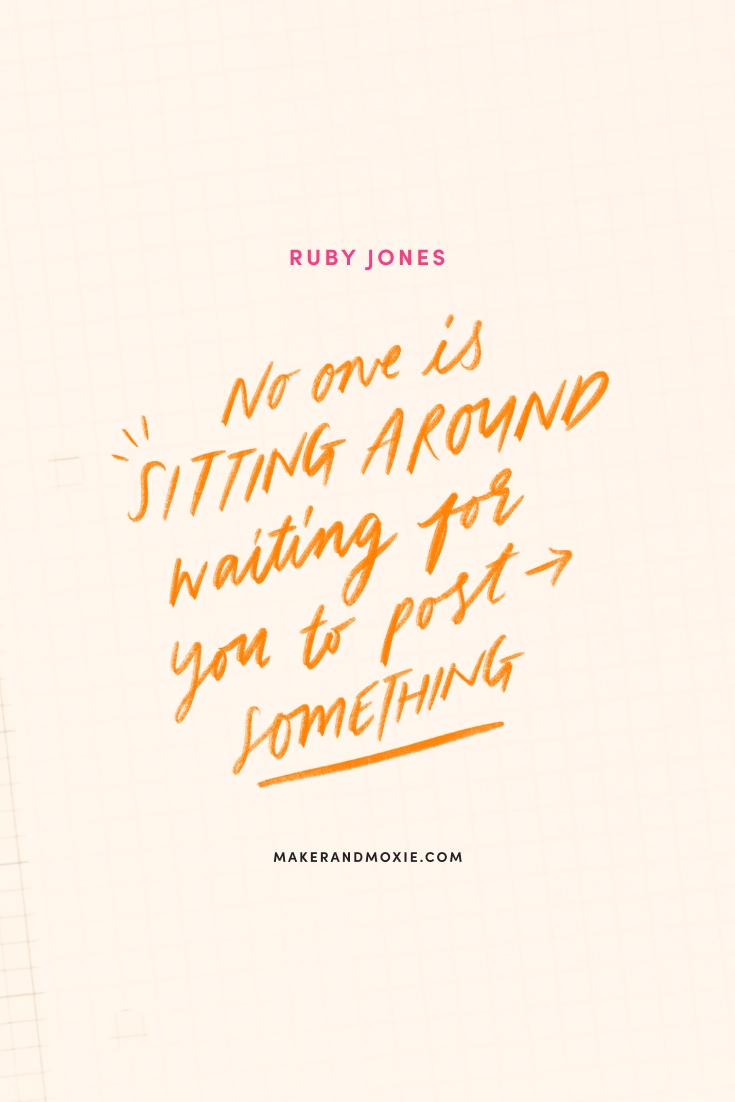
And I don't know, I feel we put a weird amount of pressure on it sometimes. And while I love it, I think sometimes I can tell when I start to put more energy into working that side up then that can take away from actually doing art and stuff. I'm aware of just finding an okay balance that works for me there.
So that's a long winded answer that I don't really have a strategy.
while I love it, I think sometimes I can tell when I start to put more energy into working that side up then that can take away from actually doing art
No, I think it's a very healthy, healthy approach to to Instagram, especially when you do have such a big audience, I feel like it could very easily become quite a big pressure. So to have that self awareness and the ability to separate that and be like, “no, I want this to still be fun and still be a healthy relationship with my audience” is really good.
And so where are you posting on social? Are you focusing on just one platform or are you everywhere?
It is pretty much just Instagram at the moment. I have made a TikTok account, but I don't I'm not sure how I feel about it yet. I've made two videos. And I don't know, it's a kind of a space I want to get into.
My brother said I'm too old for it, but I really want to get into more just videos in general, not just because that's what the algorithm is demanding, but like, animation and stuff. I'm so aware that there's so many doors I'm yet to even go through and look at, so yeah, at this stage, just Instagram, I do still have Twitter, or X, but I'm not really on there.
there's so many doors I'm yet to even go through and look at
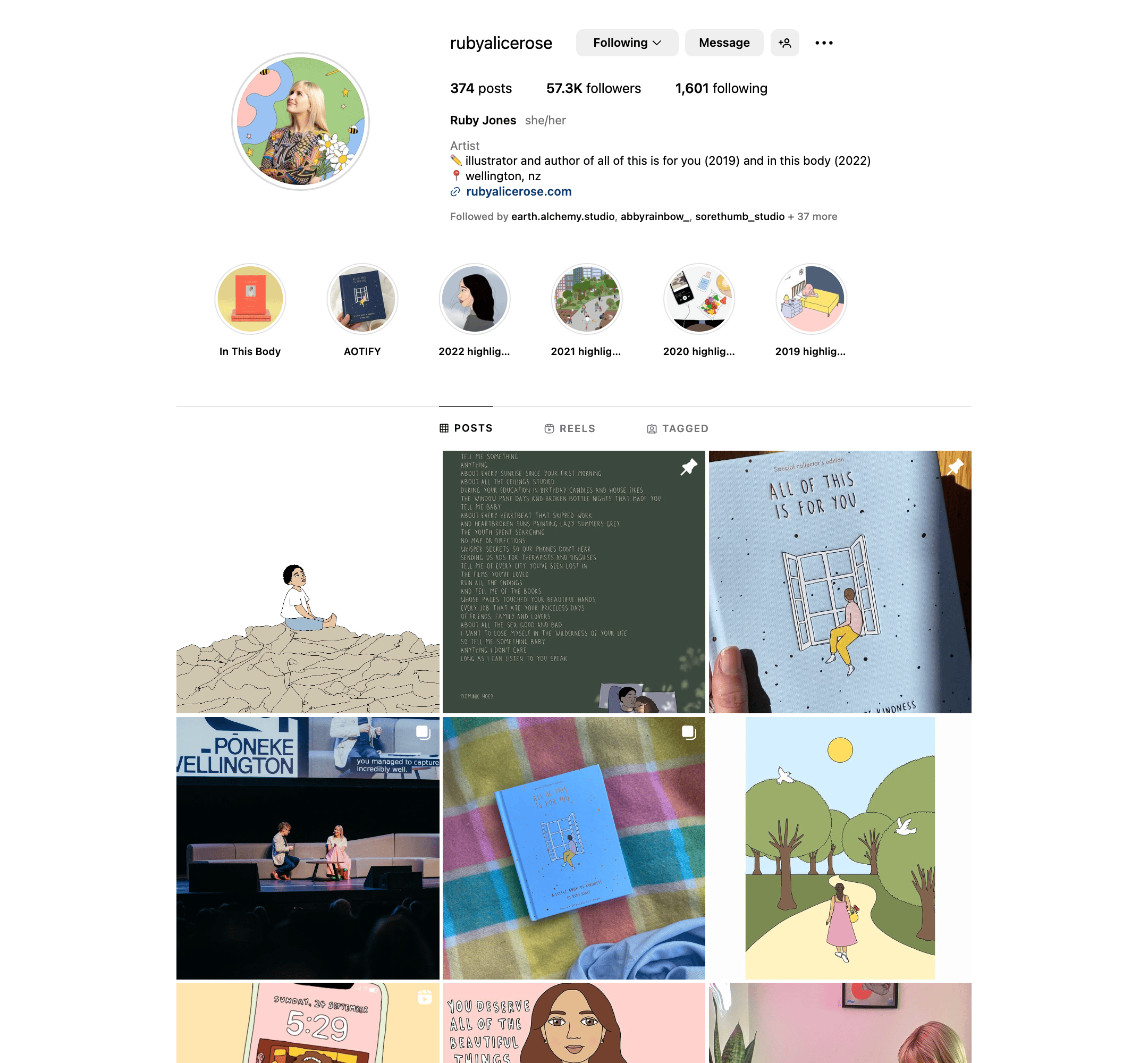
Yeah, fair enough. I think a lot of people are not really on there now.
Yeah.
I love that. I think it's cool that we can focus on one platform and then explore as you feel interested or intrigued by exploring rather than feel forced to because everyone else is or an algorithm is telling you that you have to.
And that's what I try and teach people is to just do what you find interesting and is the type of content you actually want to be making. Because if you try and force yourself to make video but you hate making video, then you're going to get burnt out on making videos, right? That's not going to be fun for you. It's not going to have good results in the long run.
But if you love making video and you're actually excited about that, then that's great. Or if like you said, you're like, “ooh, what if I could animate some of my illustrations or I could do some of this and that could be fun, then that's exciting and you should follow that curiosity.” So that's exciting and I'm interested to see how your TikToks go.
It is so that thing though, when you feel excited about making something that makes a world of difference. If it's just for the sake of “I have to be relevant or I have to be seen,” then that, I don't know, that just becomes pretty tedious, I think.
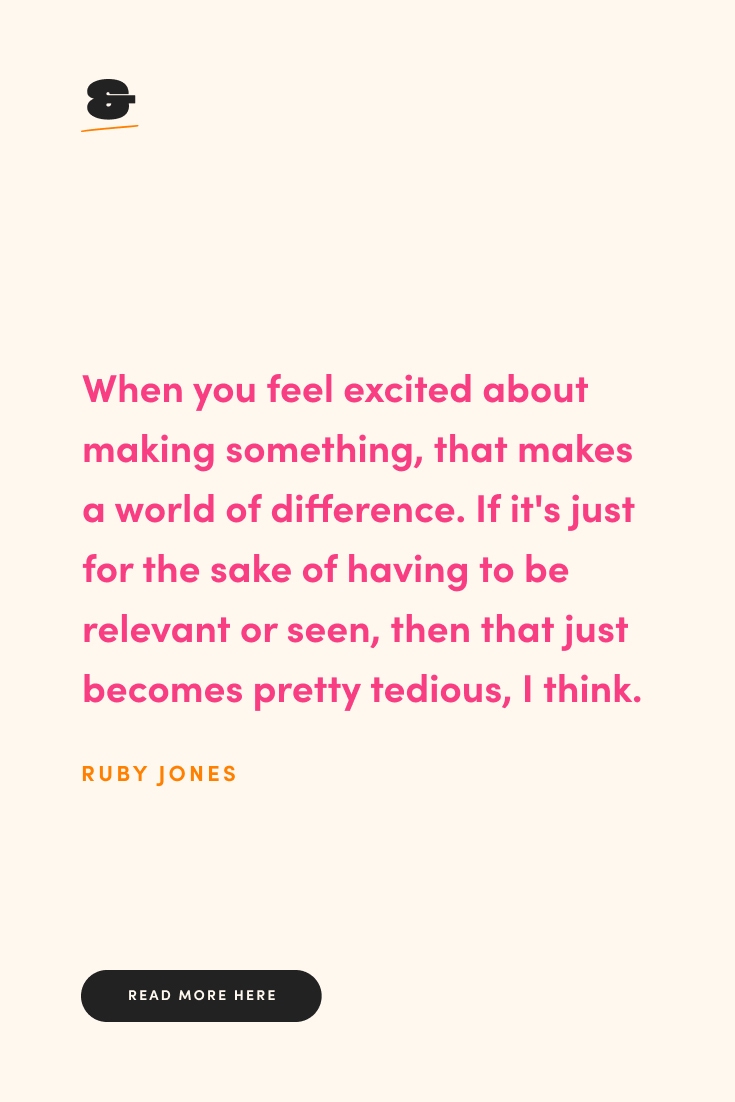
When you feel excited about making something, that makes a world of difference. If it's just for the sake of having to be relevant or seen, then that just becomes pretty tedious, I think.
For sure. And that’s what creativity is about, right? Curiosity – following that intuition, that ideation and excitement of “what if I tried this” or “what if I turn this idea into this?” That's what it should be, and it is a little sad sometimes that we feel forced to try these things rather than just following that creative spirit. So I applaud you for resisting, I love that.
So right now you have your books, you have your shop of products, you're doing work for clients, you're also like doing things like this, you just spoke at Semi Permanent last week. You've got a lot of things going on.
I would love to know how do you balance all of the parts of being an illustrator and building and growing a creative business? What is your approach to balancing everything?
I feel like I learned a lot from that first year or two about burnout, and I'm so aware now of not going near that. I love my work. I love what I do. I know how privileged I am, but that doesn't mean it's not still work. I think lots of people can just kind of think we're sitting around with our feet up, drawing little pictures, having tea all day and it's kind of, half of it's emails and text stuff and it's not. We're not always just drawing and painting and having a lovely time.
I think lots of people think we're sitting around with our feet up drawing little pictures having tea all day
But I think for me it is about learning to actually say no to some work. I used to feel this sense of, “I better say yes to everything in case nothing comes along tomorrow.” And now I just want to do the work that I love and that totally aligns with my values and what I care about.
for me it is about learning to actually say no to some work
And, I also have kind of learned to, I feel like I used to bend over backwards for people a bit. And now I've actually learned, oh no, I'm allowed to also negotiate, due dates and stuff like that. So I'm just better at now being more assertive and spreading out my workload rather than, you know, working crazily till 2am for weeks on end. So, yeah, I think it's just about recognising when you need to stop and actually put yourself first.
I think it's just about recognising when you need to stop and actually put yourself first.
And I think as well as, freelance is easy to when you go to your regular office job and you happen to have a sick day or take a few days off and you leave - it's so easy to forget to do that as a freelancer. So I think actually recognising, I feel really awful today, I just need a day for me. You know, just little things like that.
Yeah, absolutely. I am still learning that same lesson, but we get better at those things over time for sure.
I was also reading some of your other interviews that you had done and I read in an interview that you had done with Smiling Mind that you had said that at the time, this is in 2022, that you had found yourself overwhelmed with the state of the world.
Obviously there's still a lot kind of going on with the world right now. And often, there's lots of things going on in our personal worlds too. How do you keep creating, keep building your brand, keep being creative when there's so much going on and when maybe you do feel overwhelmed or there is a lot of things going on? How do you approach that?
That's such a good question. I think for me, I definitely do still clearly get overwhelmed by the state of the world, but I think I kind of let myself I try not to get too overwhelmed with it.
And in myself, I try and live every day remembering how grateful I am for everything I have, how lucky I am.
And I think I've kind of worked out ways of putting that into my everyday life. even when I make a coffee in the morning, I don't say anything out loud or have a post it note or anything, but in my head I'll just be like, “how lucky that I can just press a button and I have a hot cup of coffee in my hands, or that I can turn the tap on and I have running water.”
So like, I just try and have those little moments through the day. that remind me how lucky I am and how beautiful life is for me right now here. And l hold on to that for me and not try not to feel guilty about what else happening around the world that I actually can't change though. Cause I think I used to kind of sit with that a lot and end up in like this ball of overwhelmed anxiety and stuff.
I think it's about recognising what I can't change, and then actually channeling that into work when it feels right as well. I did feel this strange pressure for quite a long time to comment on every big world event, and I kept getting messages from people saying, can you talk about this thing in this country, and do a drawing for this thing? I remember thinking, oh my god, am I meant to be doing that? And then I realised, I just had to pull it back to that, the first illustration was so, it was so genuine, it was so in the moment, and I was like, I can't force that. So I remind myself of that too. I don't ever try and force something out about a big idea or a big conversation, I just kind of let it come to me, you know, even if it's 2am and you have a thought, I would just go to town, but.
I don't know if that answered your question.
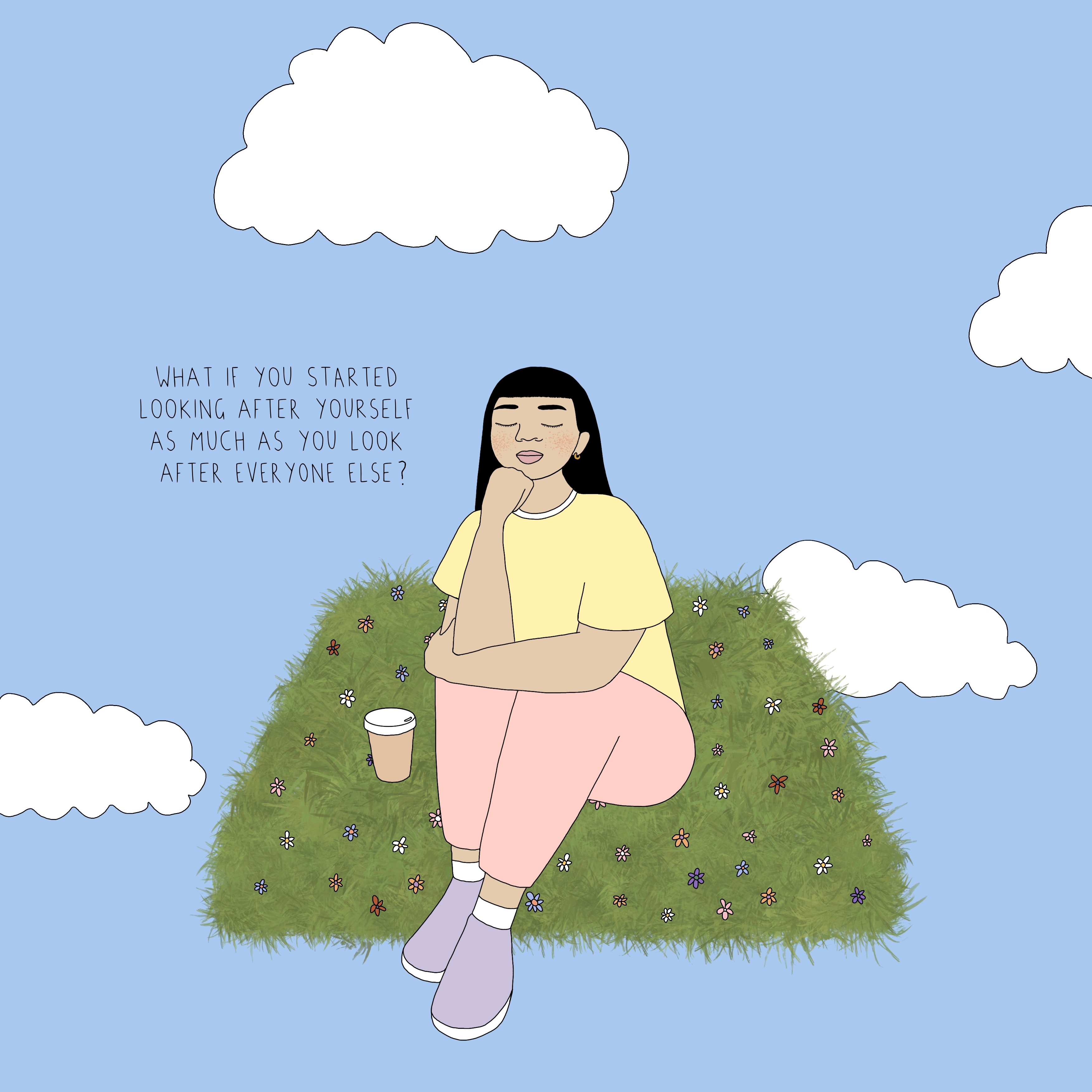
Yeah, definitely. I love that idea of grounding yourself in gratitude and reminding yourself of the things you can't can't control so that you can channel your creativity in ways that you can control.
I think that's a really good balance, and a nice way to be able to not get too overwhelmed when things are overwhelming, whether that's in your personal life or in the world. It’s helpful, in both ways.
And so to wrap things up, I have a couple of questions that I ask everybody. My first question is, what do you think is the biggest lesson that you have learned about branding your passion?
I don't want this to sound like a negative one, but I think I've learned that if you do work that appears really soft and feminine and caring, people often think that you will happily work for free and I feel like businesses often want to also use that to their advantage.
So, I guess I've just learned to be wary and to actually just remember to hold on to what your work means to you and not let people take you for a ride, if that makes sense.
hold on to what your work means to you and not letting people take you for a ride
Yeah, that does make sense.
Yeah. We're not working for free.
That's definitely a great lesson that you have learned and that we can pass on. And that is good that you have learned that, that now you can stand strong that way, even if people come with those expectations, you can be like, “well, no, I might look that way, but actually not.”
Absolutely.
If you were to give some advice to other creatives who are thinking about branding their passion, what advice would you like to share with them?
Lame as it sounds, I think at the end of the day, remembering what the work is that makes you happiest and what you love making, because the minute you try and feed into what you think other people want or what the algorithm wants, I feel like you're just going to end up kind of miserable and I feel like that can also come through in your work if you're not loving it, people can tell that, you know.

Remember what the work is that makes you happiest and what you love making, because the minute you try and feed into what you think other people want or what the algorithm wants, you're just going to end up kind of miserable and that can also come through in your work. If you're not loving it, people can tell.
Amazing. Wow. Thank you so, so much for sharing your story and your advice and your lessons with everybody. I have loved learning all of that about you and I know that everybody listening is going to learn so much from your story and everything that you have shared. So thank you so much.
Do you want to tell the people where they can find you and what you would love for them to go and check out?
Thank you so much. My handle is @RubyAliceRose and my website is rubyalicerose.com, you can just go look at my little drawings there. You can say hi to me anytime. I don't have anything to promote right now. I'm wrapping up for the year, but thank you so much for having me, it's been such a pleasure.
No problem. Thank you for joining me and I'll put all the links to all those things. And you said you have nothing to promote, but you can go and check out the books, you can go and check out the shop, buy all the prints. I want to go get the teacup one! So we're going to go support Ruby and all of those ways!
Thank you so much.
Thank you so much to Ruby for joining me on this episode of Brand Your Passion – I loved this conversation and I hope you did too. Her values, light, and kindness are things I think we can all aspire to, and I can’t wait to keep following her journey!
To support Ruby, check out her website, buy her books, and shop her prints. You can also follow Ruby on Instagram for even more insight into her work.
Pin one of these graphics to save this post for later

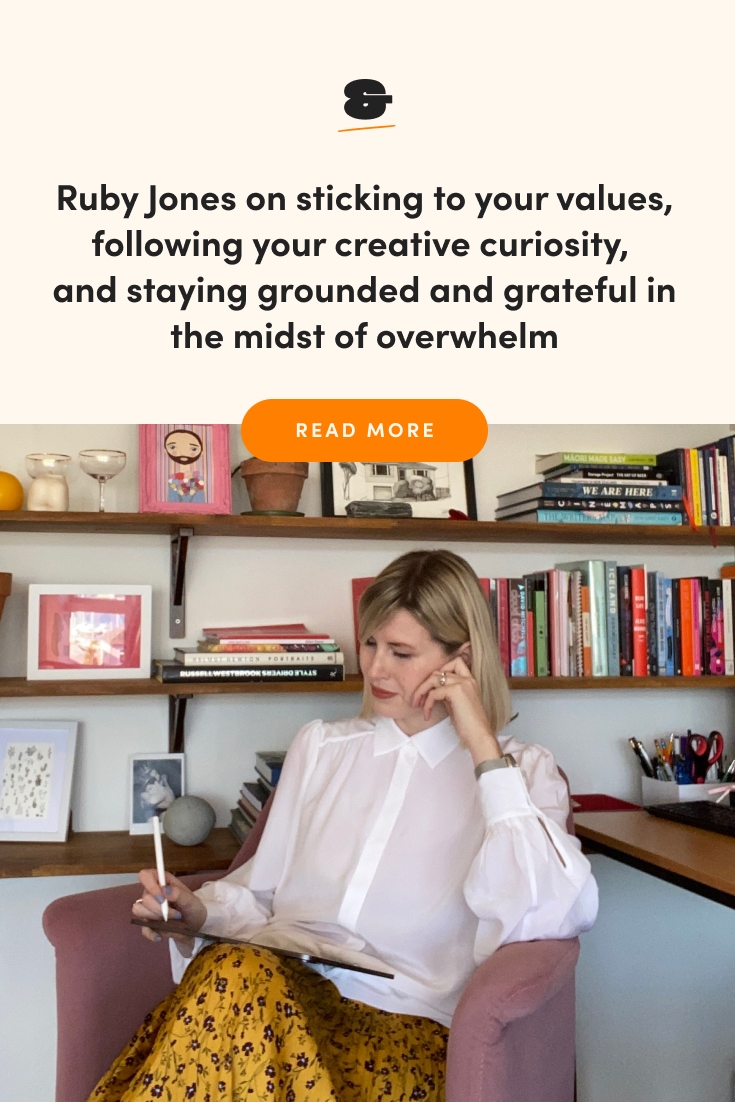
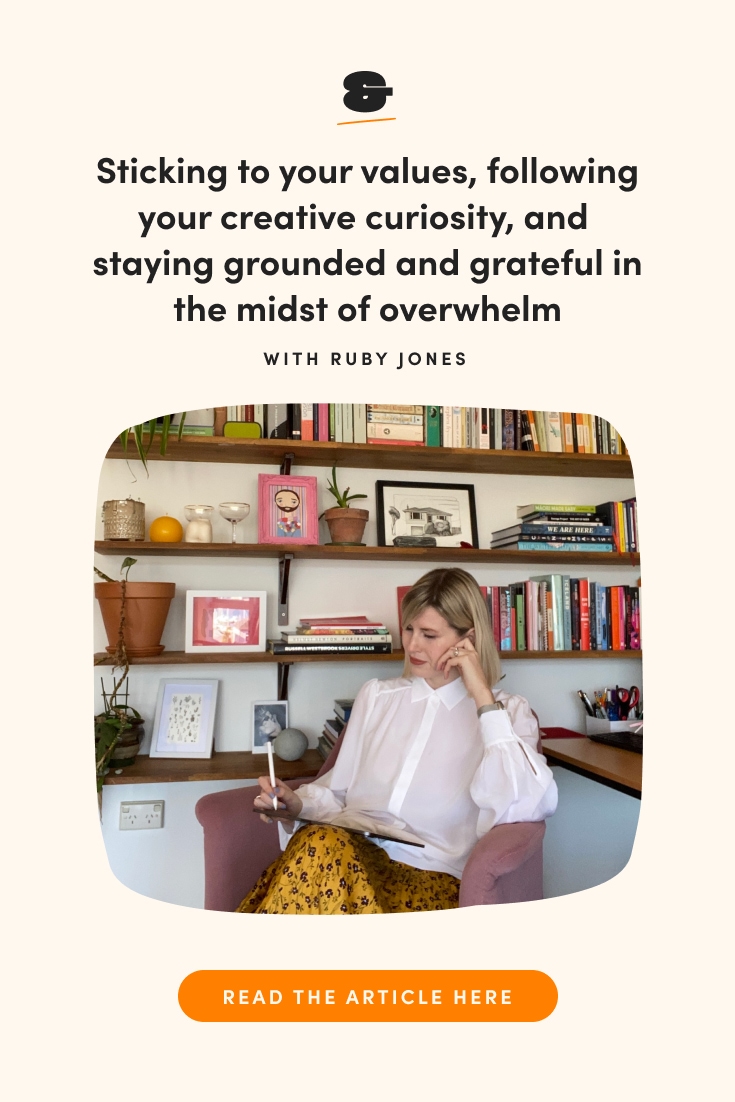

November 29, 2023
more from














